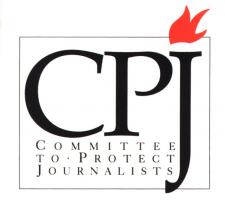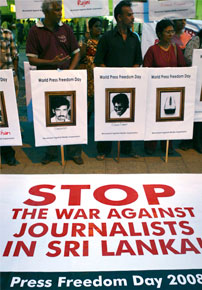Politkovskaya‘s murder – unpunished
Anna Politkovskaya, a reporter with the fiercely independent Moscow newspaper Novaya Gazeta, had reported on human rights abuses in the Chechen Republic and attacked Russia’s President Vladimir Putin personally for indifference, ineptitude, incompetence and cruelty. She was the 13th journalist to be murdered since Putin had come to power in 2000, and at the time there had not been a single conviction. This record of  impunity was producing fear and self-censorship among Russian journalists, undermining efforts to report on a variety of controversial issues, from corruption to human rights abuses.
impunity was producing fear and self-censorship among Russian journalists, undermining efforts to report on a variety of controversial issues, from corruption to human rights abuses.
A month later, hundreds of leading journalists from the United States and around the world gathered in the grand ballroom in New York’s Waldorf Astoria hotel for the annual dinner of the Committee to Protect Journalists (CPJ). Paul Steiger, chairman of Committee to Protect Journalists, and at the time the managing editor of the Wall Street Journal, asked guests at the dinner to sign a petition expressing outrage and calling on Russian authorities to prosecute the killers of journalists.
Importance of international pressure
In January 2007, a CPJ delegation travelled to Moscow to deliver the 400 petitions gathered at the dinner. They were handed to Ella Pamfilova, chairwoman of the Russian Human Rights Council, who promised to deliver them personally to President Putin. They also met with representatives from the Russian foreign ministry, who told them that officials were investigating individuals in the Chechen police as possible suspects in the Politkovskaya murder. That news made headlines, especially after the Russian authorities denied that they had said it.
Soon after this visit, during his annual press conference, Putin delivered a new message. “For our country . . . the issue of journalist persecution is one of the most pressing. And we realise our degree of responsibility in this,” The president’s dramatic about-face seemed to demonstrate that international pressure could make a difference.
a new message. “For our country . . . the issue of journalist persecution is one of the most pressing. And we realise our degree of responsibility in this,” The president’s dramatic about-face seemed to demonstrate that international pressure could make a difference.
The decline in the Russian media also had international implications. If the Russian Federation could simply ignore basic human rights standards and still keep its place on the world stage, what message would that send to aspiring democracies around the world? More alarming still, a similar pattern could be observed in every country in which crimes against journalists go unpunished, from Mexico to Pakistan. According to CPJ research, 89 per cent of the 700 or so murders carried out on journalists around the world since 1992 have gone unpunished. In order to advance the cause of press freedom, CPJ had to find a way to beat back the culture of impunity on a global scale. But how?
Best practices needed
In Latin America, the Inter-American Press Association — or IAPA — had been battling impunity for more than a decade. The effort had begun to show results. Since 1992, 143 convictions have been obtained in journalists’ killings in Latin America, according to IAPA statistics. Ninety-two people are currently jailed, most of them hired killers.
Over the next year, a widespread consultation began. Initiators – Joel Simpson and Alberto Ibargüen, the president of the Knight Foundation, former chairman of the IAPA’s anti-impunity campaign – were talking to journalists around the world, and hosting a strategy meeting at CPJ. At the end of the process, they identified two countries where they would test their efforts: the Russian Federation and the Philippines. Both countries were among the most murderous for journalists, according to CPJ research. Both had abysmal records for bringing the killers to justice.
In February 2008, CPJ joined forces with the Open Society Institute, the Bangkok-based Southeast Asian Press Alliance and the Manila-based Center for Media Freedom and Responsibility to co-sponsor an international conference on “Impunity and Press Freedom” in the Philippines. The conference brought together nearly 200 participants, including representatives of the Philippine government, to discuss the issue of impunity and seek solutions.
The conference’s keynote address came from Supreme Court chief justice Reynato Puno, who declared, “Bullets fired in the direction of journalists pierce not only human flesh, but also our republican ideals.” His remarks indicated that we would have the clear support of the highest levels of the judiciary if we confronted the country’s political leaders on the impunity issue.
At the end of the two-day event, J.Simon announced that CPJ would be joining forces with a unique local press group, the Freedom Fund for Filipino Journalists, or FFFJ, to campaign against impunity in the Philippines and The daughter of Marlene Garcia-Esperat (centre) grieves over her mother’s coffin, Tacurong, Philippines, 9 April 2005 that this would be part of a global effort.
Humanizing the issue of impunity
One of the lessons of the IAPA campaign in Latin America was the need to humanise the issue of impunity by highlighting key cases. In the Russian Federation, Politkovskaya had become the symbol of their struggle. In the Philippines, Marlene Garcia-Esperat would play this role. Garcia-Esperat, a crusading columnist from the volatile island of Mindanao, had been gunned down in front of her family in March 2005.
volatile island of Mindanao, had been gunned down in front of her family in March 2005.
In August 2007, in an apparent breakthrough, Russian prosecutors had announced the arrest of ten suspects. That same month, five members of a criminal gang in the republic of Tatarstan were convicted of carrying out the 2000 murder of Novaya Gazeta reporter Igor Domnikov. These were the first convictions in a journalist’s killing since Vladimir Putin had come to office.
Two months later, in November 2007, CPJ honoured Novaya Gazeta editor Dmitry Muratov with an International Press Freedom Award. In February 2008, as part of an event at the American Academy in Berlin, Muratov and a delegation from CPJ met with the national security adviser to Chancellor Angela Merkel, and asked and received assurances that Merkel would pursue the issue of impunity in bilateral meetings with President Putin. It was this kind of international pressure that helped push the Russian government to move against Politkovskaya’s alleged killers. By the end of the year three young Chechens who had been arrested back in August and had been accused of serving as lookouts for the gunmen were on trial in Moscow.
How to measure progress?
The initiators asked themselves a fundamental question. How could they measure progress in the Russian Federation and Philippines? And could they use an objective barometer of impunity as a means of goading recalcitrant governments toward action?
Since 1992, CPJ has compiled the most comprehensive and detailed list of journalists killed around the world. They pored over this data, breaking down the numbers, and looking for a way to document impunity. After consulting a variety of experts, including statisticians, and carrying out months of additional research, they developed a formula.
Impunity index
They would look at a ten-year period and include on their list only those countries with at least five unsolved murders. They defined “unsolved” generously – these were killings in which there had not been a single conviction. Recognising that the murder of a journalist would have a different impact in a country like Mozambique, which has a tiny press corps concentrated in the capital, than in Brazil or India, where the media is both enormous and diverse, they sought to find a way to weight their findings. Since it was impossible to determine the size of the press corps in any given country they used population figures. They divided the number of unsolved murders by the size of the population to come to an objective figure based on careful research – a number that governments couldn’t challenge. They called it the Impunity Index.
As they crunched the numbers a clear picture emerged. Iraq, with 79 murders at the time and an Impunity Index of 2,821, was far and away the most deadly country for journalists. It was followed by two other war-ravaged countries, Sierra Leone and Somalia. Most of the remaining countries on the list were democracies, including Mexico, India, Colombia, and of course the Russian Federation and the Philippines. Their inclusion, according to them, would be deeply embarrassing to their governments. And while they wanted to highlight their terrible records, they also sought to present the governments in these countries with a way to get off the list or at least improve their standing.
In their previous tallies of murdered journalists, they had ranked countries by the number of journalists killed. Since governments could not undo these murders, there was no way for them to improve their record. By including only unsolved killings on the Impunity Index, their goal was to provide an incentive to bring the killers to justice. In subsequent years, they hoped that countries they had targeted for campaigning would begin to move down the list.
Campaign starts
They launched their first Impunity Index at a press conference at the United Nations. They talked about the overall impact of impunity, the fear it engendered, and the toll it took in terms of self-censorship and public accountability. They highlighted the records of the Russian Federation and the Philippines.
The launch of the Impunity Index was, for them, year zero in their campaign. The basic elements were now in place. They created an advisory board of experts. They developed a link on their website outlining the campaign and their goals.
They distributed the Impunity Index to officials at the World Bank and the IMF and encouraged them to begin using it as a yardstick for measuring democratic development. They met with UN secretary general Ban Ki-Moon and asked him to speak out about the issue. They co-ordinated their efforts with their many colleagues on the international and domestic level — groups like Reporters Sans Frontieres and the International Federation of Journalists. In a relatively short period the word “impunity” had entered the press-freedom lexicon. The next step was turning the growing public awareness into action.
In the Philippines, the FFFJ rolled out a publicity campaign featuring radio spots and newspaper ads to increase awareness about impunity. Lawyers were hired to file legal appeals. Money was invested in protecting threatened witnesses. And in endless meetings they kept the pressure on police and prosecutors. In the Russian Federation, they began working with reporters on the ground in Moscow to lay the groundwork for a major report on impunity to be released the following year.
In March 2009, their second annual Impunity Index was released, this time in Manila. They timed the release for the fourth anniversary of the killing of Marlene Garcia-Esperat as a way to dramatise their concern and highlight the failure of the Philippine criminal justice system to achieve justice in her case.
Results
Overall, there were only modest changes between the 2008 and 2009 Impunity Index. Yet what changes they observed were significant. Colombia, for example, had dropped a spot on the list, from fourth to fifth, as its Impunity Index rating declined more than 20 per cent. A dramatic improvement in the country’s security situation led to a decline in violence against the press. International and domestic pressure, including the IAPA’s campaign, certainly played a role.
In the Philippines, aside from the modest progress in the Esperat case, there were few successes to highlight. The country remained in sixth place on the list with 24 murders documented by CPJ and no successful prosecutions in the previous year.
The release of the Impunity Index also received widespread attention in the Russian media, including on many widely read websites. But as in  the Philippines, the increase in public awareness has not immediately translated into effective action. the Russian Federation remained mired in ninth place on the list, with prospects for improvement dim. Two journalists have been murdered in 2009, both from Novaya Gazeta.
the Philippines, the increase in public awareness has not immediately translated into effective action. the Russian Federation remained mired in ninth place on the list, with prospects for improvement dim. Two journalists have been murdered in 2009, both from Novaya Gazeta.
Meanwhile, the case against the alleged accomplices in the Anna Politkovskaya case had fallen apart. Not a single one of the ten suspects arrested in August 2007 remains in custody.
On 15 September, a CPJ delegation arrived in Moscow to present a detailed 72-page report on the failure of Russian authorities to achieve justice in the killing of 17 journalists since Putin first came to power in 2000.
Immediately following the Moscow press conference, the CPJ delegation met with a team of 11 investigators looking into the murders. Two weeks before the visit, the Russian Supreme Court returned the Politkovskaya case to the prosecutor’s office for further investigation and ordered that the case against the triggermen and masterminds be merged.
The premise behind CPJ’s global campaign against impunity is that public advocacy puts pressure on the authorities to investigate murders and investigations lead to convictions. The increased likelihood of punishment serves as a deterrent to future killings, and eventually the pace of killing slows. If their hypothesis is correct, these changes will be captured on their Impunity Index over time.
What was achieved in the first year and a half of the campaign?
Because of intensive media coverage, the issue of impunity for the killers of journalists has entered the public consciousness in both the Russian Federation and the Philippines. It is also firmly on the international agenda. Both the Arroyo and Putin/Medvedev governments have spoken out publicly against impunity and taken a variety of steps. But these steps have not necessarily translated into significant progress on the legal front. There are encouraging signs in both countries — venue changes in the Philippines, and a vigorous investigation of the Politkovskaya murder. But convictions are a long way off.
If and when convictions are obtained, they will seek to determine if this leads to a decrease in violence. They believe that this correlation exists, but will only emerge over time. Ultimately, it may be that the culture of impunity cannot be defeated outside consolidation of the rule of law and an overall improvement in security.
According to Simon, like crime itself, impunity can never be entirely eliminated. But even if justice in an individual case does not correlate with an immediate reduction in overall levels of violence, they are bound by a moral imperative to seek justice on behalf of their colleagues when they are killed. In a globalised world, free movement of information across borders must be assured and that the many enemies of press freedom do not have the ability to censor the global dialogue. Standing up to the killers of journalists in the Russian Federation, the Philippines, or wherever they strike, is the primary obligation of those fighting for a free press.
 Joel Simon is executuve director of the Committee to Protect Journalists
Joel Simon is executuve director of the Committee to Protect Journalists
Here you can find the full article by Joel Simon.


